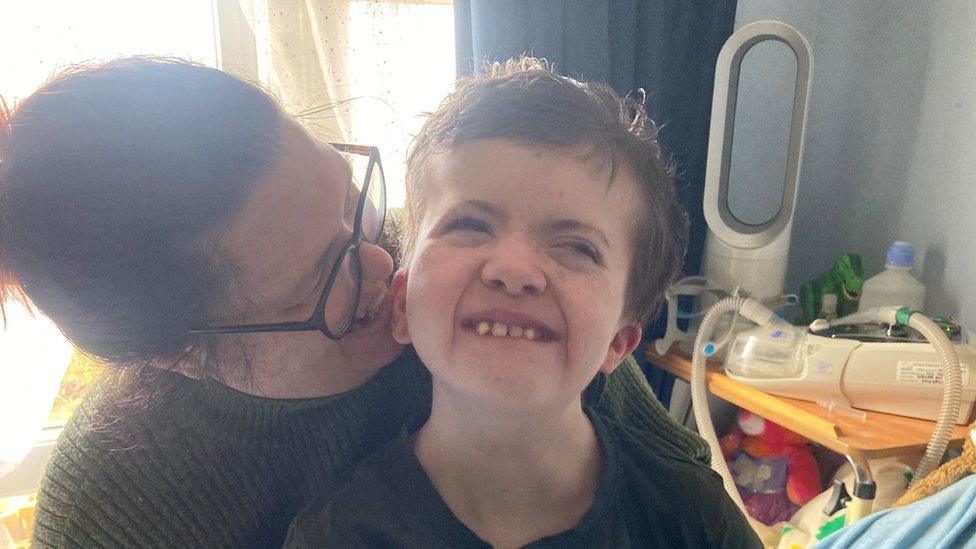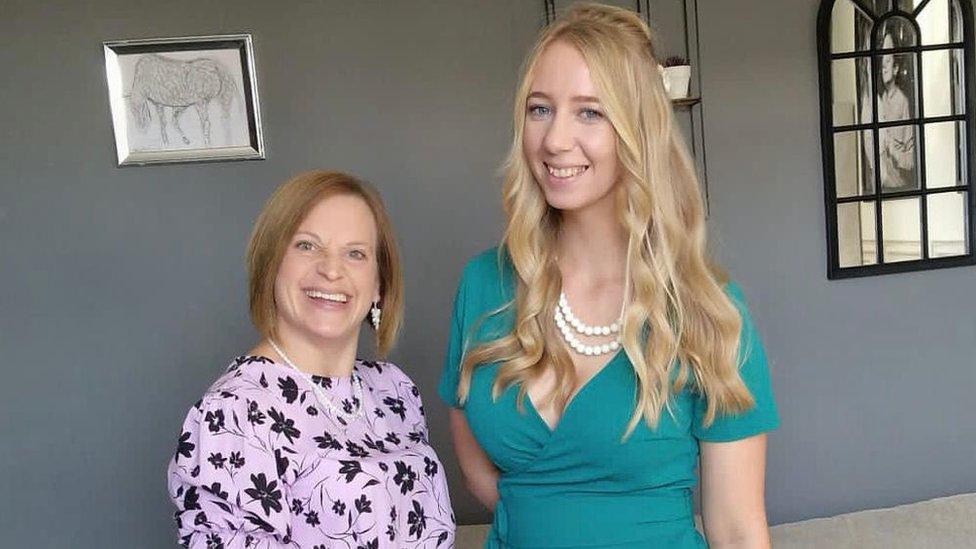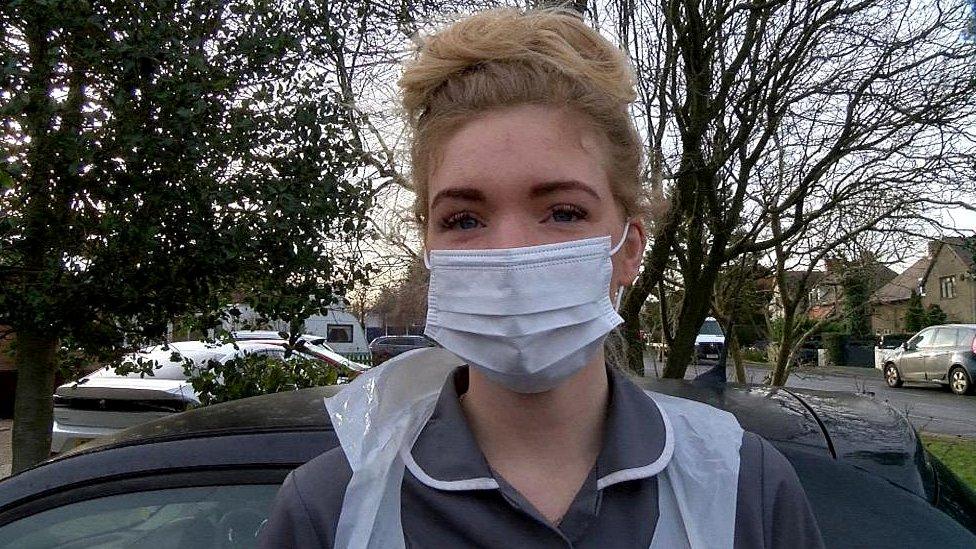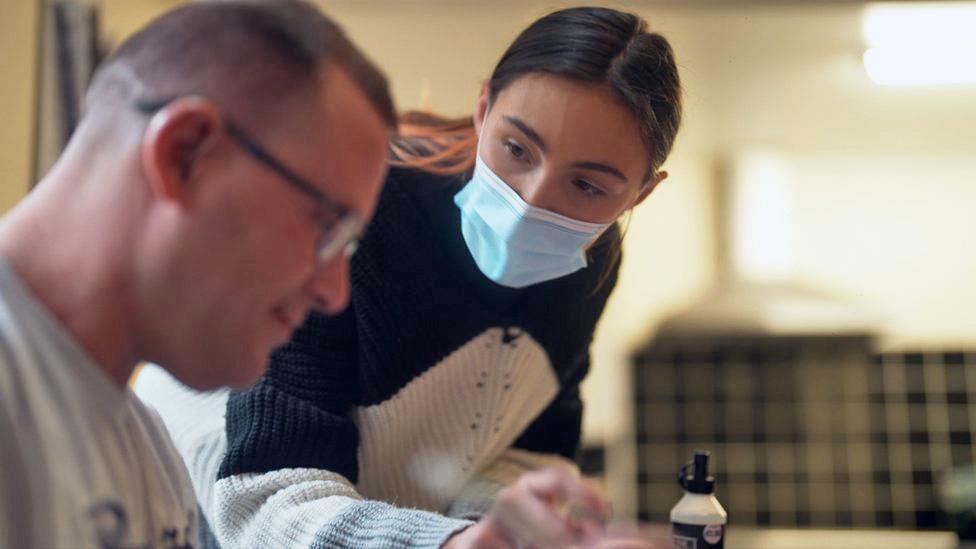PA shortage leaves disabled people and their carers struggling
- Published

Michelle Lloyd and son Billy have been without a personal assistant since September 2021
A shortage in personal assistants is leaving disabled people without vital support, according to one organisation.
The Wiltshire Centre for Independent Living says families are struggling to find help despite council funding for people who qualify for additional care.
Personal assistants (PAs) help people with disabilities live independently and offer respite time for carers.
Swindon Borough Council and Wiltshire Council say they are reviewing current PA pay rates.
Swindon Borough Council has this week confirmed it is upping its hourly rate to £16.28 in an effort to recruit more PAs.
Michelle Lloyd, 37, from Swindon has to be available 24/7 to care for her teenage son Billy who has Dandy Walker Syndrome.
Mrs Lloyd said: "We need a PA to come into the house and look after him just for an hour or two whilst we have a shower, wash our hair, just have a cup of tea that's hot.
"I've not been able to do that for 18 months now."
'Pay is too low'
Mrs Lloyd believes the shortage of PA's is largely down to poor pay.
She said: "For Billy particularly, his needs are so complex. It's almost like being a nurse for £11 an hour."
The family's last assistant had to leave the area in September 2021. Since then Mrs Lloyd has had to give up work to care for Billy.

Bron Edwards is a personal assistant to Becky Harrison who is registered blind
Bron Edwards, 30, is a PA for her friend Becky Harrison, 37, who is registered blind due to multiple degenerative eye conditions.
Mrs Harrison said: "If I didn't have a support worker I couldn't go out independently so it just opens up my world
"I just couldn't be without her now."
She says she was very lucky to find Mrs Edwards, who responded to a Facebook advert posted to friends and family, and that for most it is not that easy.
Mrs Harrison said: "They [PAs] are extremely difficult to find - especially one that fits with your needs."
'Needle in a haystack'
Mrs Harrison said she feels the current system is not working.
"You're given the hours and it's agreed that you have a need but then you're left to your own devices to find the right person," she said.
"That's like looking for a needle in a haystack."
Mrs Edwards said that despite the profession being "underpaid and undervalued", she "loves" supporting Mrs Harrison.
"I like helping her to still be independent and watching her reach all her goals and her dreams because her life has changed dramatically," she added.

Becky Harrison can take part in sessions run by Swindon Bats Sports & Social Club for the visually impaired
Hannah Dias, who has Down's Syndrome, is a student at New College, Swindon.
The 18-year-old has been given funding by Swindon Borough Council for additional care but has so far been unable to find a personal assistant.
She said a PA will help her to grow as an adult and live more independently, helping with issues like time management, do things like cooking and allowing her to start new hobbies.
"Living independently is important for me as I grow as an adult," she said.

Maria and Hannah Dias, from Swindon, said they did not know they could get the help of a care support worker
Maria Dias, 60, has been her daughter's main carer all of her life.
She said: "I get exhausted. All these years I've been doing it all by myself I didn't know until Hannah was at college that I could get funding for a support worker."
Mrs Dias said that although she now knows she is entitled to additional support, she still cannot find the right person.
"In the case of my daughter her timetable is packed and it's very difficult to find somebody that will support her for the six hours that has been offered to her."
'People being left behind'
Abbie-Jo Lawrence is a personal assistance development officer for the Wiltshire Centre of Independent Living.
Mrs Lawrence, who has cerebral palsy, said: "We are at a point nationally - not only Wiltshire - where people are struggling to recruit PAs and are being left without care or support.
"This then leads to having [to get] agency [staff] to come in and do the care, which works for some people but doesn't always work for others or fit in with their life, and/or having to rely heavily on friends and family for their care.
"Not having the right care or support in place can have a devastating impact on the individuals and those closest to them."

Abbie-Jo Lawrence (L) works to recruit personal assistants such as hers, Danielle Toogood
Mrs Lawrence said having the right support at home and work is "vital" for her and her family.
"Having PAs means that I can maintain a healthy relationship with both my husband and children," she said.
"I don't want my husband to be my carer as I feel it would put pressure on and impact our marriage and it's really important that this doesn't happen."
Wiltshire Council works with Mrs Lawrence to dispel stereotypes and promote the role of a personal assistant as a fulfilling career path.
Mrs Lawrence said there were many myths about the role of a PA.
"It's not all about unsociable hours. The hours of work can vary for a few hours a week up to full-time hours and they can be across the week so there's hours to suit anyone looking," she said, adding that it can cover a variety of tasks, not all of which are about personal care.
Salaries under review
Wiltshire Council said: "People told us they were finding it difficult to recruit PAs but more recently this has been improving and the number of active PAs has increased and the time to recruit new PAs is quicker."
Both Swindon Borough Council and Wiltshire Council say they are reviewing the £11 hourly rate for PAs.
Swindon Borough Council said: "The Council is currently working with the South West Direct Payment Network on this issue which is recognised as a barrier across many regional local authorities."

Follow BBC West on Facebook, external, Twitter, external and Instagram, external. Send your story ideas to: bristol@bbc.co.uk , external
Related topics
- Published13 March 2023

- Published20 December 2022
